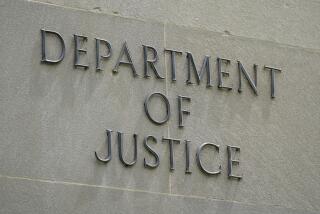Bagram: a legal black hole?
- Share via
A federal appeals court has ruled that, unlike inmates at Guantanamo Bay, Cuba, some 800 prisoners held at a U.S. military base in Afghanistan may not challenge their confinement by seeking writs of habeas corpus. The decision may be a fair reading of Supreme Court precedents, but it shouldn’t be taken as a blank check for treating the Bagram airfield as the sort of legal black hole Guantanamo was before the courts intervened.
In a 2008 decision granting habeas rights to Guantanamo detainees, Justice Anthony M. Kennedy stressed that Guantanamo was an area over which the United States had “total military and civil control.” By contrast, according to the U.S. Court of Appeals for the District of Columbia Circuit, Bagram is located in a “theater of active military combat” over which Afghanistan exercises practical as well as legal sovereignty.
These are not distinctions without a difference, but they raise the possibility that Bagram could become what the George W. Bush administration hoped Guantanamo would be: a place where suspected terrorists picked up anywhere in the world could be deposited indefinitely and denied meaningful opportunity to confront their accusers or meet with lawyers. It’s notable that the three prisoners who sought habeas relief in this case say they were captured outside Afghanistan.
Fortunately, the court reserved for the future the question of whether the government could transfer prisoners to Bagram or other combat zones “to evade judicial review of executive detention decisions.”
In our view, suspected terrorists captured outside Afghanistan should be treated the same as Guantanamo detainees, with the right to pursue habeas actions. As for prisoners at Bagram who were captured in Afghanistan, the appeals court was right to describe that country as a combat zone. But unlike a conventional war, in which the enemy wears uniforms and can be held until the end of hostilities, the war against the Taliban and Al Qaeda involves the possibility of mistaken identity.
To its credit, the Obama administration last year instituted a new appeals process that allows prisoners, with the aid of a “personal representative,” to challenge their incarceration. The administration should now work with human rights groups to ensure that this process offers a fair opportunity for inmates to assert their innocence. Otherwise, President Obama will be untrue to his insistence during his first week in office that he wanted to “restore the standards of due process and the core constitutional values that have made this country great even in the midst of war.”
More to Read
Sign up for Essential California
The most important California stories and recommendations in your inbox every morning.
You may occasionally receive promotional content from the Los Angeles Times.










